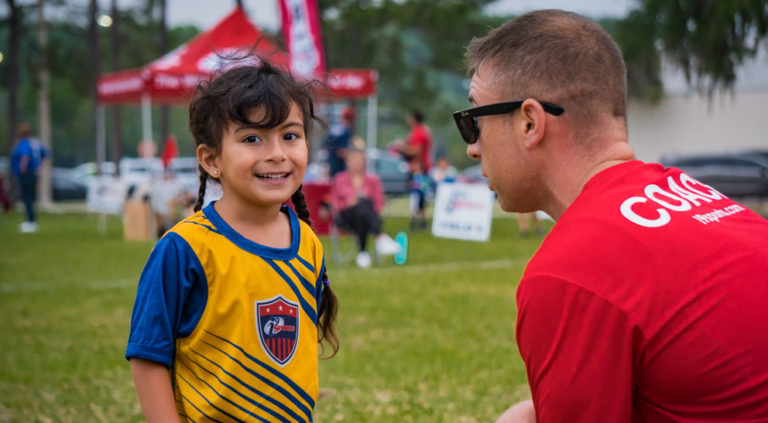How Sports Help Kids With Their Academics
When you’re considering enrolling your kids in sports, you probably think about many of the benefits that playing sports provides. You likely understand the physical and social benefits of sports, and it is important to you that sports help build character traits that will serve children well as they grow into young adults. What you may be overlooking, though, are the positive effects of sports on academics.
A recent study from the University of Kansas indicated that high school athletes were ten percent more likely to graduate than their peers who had never participated in sports. Athletes were also shown to have higher grade point averages than non-athletes. Another study from the Institute of Medicine showed that kids who are very active typically perform better on standardized tests. Why would these facts be true? It could have to do with the way playing sports increases cognitive ability. Exercise increases blood flow to the brain and activates endorphins, which can improve your mood and work performance. Athletes, then, are likely to be more willing and capable to tackle challenging problems.
There are, however, several other benefits that sports can have on academic performance.
Sports teach kids better time management
Student athletes have to juggle practice, games, team meetings, and academic responsibilities. Learning early on that every second counts makes players very aware of the need for planning and helps them reach their goals.
Playing sports teaches kids the importance of character.
Leadership, self-discipline, patience, perseverance, and a respect for authority are all developed on the field, and they serve kids well in every area of their lives. These traits help them succeed in school and lead to their continued success as adults. At i9 Sports®, we believe sportsmanship is as important as learning the fundamentals of the sport.
Kids who play sports tend to be more decisive.
When playing sports, athletes have to think quickly and make effective decisions on the fly. These decision-making skills translate well from the high-pressure environment of the sports field to the high-pressure environments of the classroom or boardroom. Kids who grew up playing sports are often able to function well under pressure and meet their deadlines more easily than their non-athletic peers.
Participation in sports builds teamwork and a sense of community.
Teamwork is an obvious effect of playing sports (and one of our sportsmanship values) and the environment in a sports team naturally fosters community. In sports, kids have to collaborate with a variety of people to reach a common goal and they gain a sense of group and individual responsibility. They learn to respect each other, behave unselfishly, and make good decisions on behalf of the team. These are all soft skills that will serve them well throughout their lives, especially in an academic setting.
Being part of a team boosts kids’ self-confidence and self-esteem.
Playing a sport and gaining the acceptance of their peers makes kids feel more confident and improves their self-esteem. Further, the encouraging words and actions of parents and coaches build a child’s self-image and make them better able to move through life with confidence in their own abilities. That confidence increases the willingness to try new things and helps students succeed in school and in life.
Emotional development is improved when kids play sports.
They learn to control their emotions, which is extremely beneficial later, when they’re facing life’s challenges instead of just challenges in school and on the field. Exercise also leads to short-term relaxation, which improves kids’ moods as well as promoting increased concentration, better memory, enhanced creativity, and more effective problem-solving. In this way, sports boost learning effectiveness and help kids succeed on and off the field.
Student athletes are less likely to participate in risky behaviors.
They don’t have excessive free time, so kids who play sports are less likely to get involved with drug and alcohol usage or participate in idle activities. They’re also more likely to find positive role models, including older students who can act as mentors and help guide them into making healthy choices.
Being involved in sports makes kids better communicators.
Team sports require communication, both verbal and nonverbal. Developing communication skills are important for maintaining a functioning sports team, and those same skills can help kids succeed academically.
Team sports provide physical benefits that boost school performance.
Playing sports helps kids learn the importance of healthy habits, like proper diet and regular exercise, that offer lifelong benefits. Sports boost memory function and cognitive function, in part because physical exercise improves the quality and duration of sleep. Additionally, chronic muscular tension is reduced with regular exercise, so kids have fewer muscular aches and headaches.
Young players learn early on how to set goals and work hard to achieve them.
That may be one reason that kids who participate in sports are more likely to complete a bachelor’s degree program. What’s more, students who held leadership roles on their teams tend to achieve higher degrees and hold leadership positions in their careers.
If you’re looking for a fun learning experience for your kids in which they can develop athletic skills, build self-confidence, and learn good sportsmanship, i9 Sports® has the program for you. We’re the nation’s largest multi-sport provider, with over 4 million registrations in communities across the United States. Through our recreational sports leagues, camps, and clinics, boys and girls are provided with opportunities to participate in popular sports like flag football, soccer, basketball, baseball, tennis, lacrosse, and volleyball. Offering age-appropriate instruction in a convenient, well-organized program that helps kids develop their athletic abilities through fun, safe competition that also helps them learn sportsmanship values. For a positive, stress-free experience for the whole family, contact i9 Sports® today!
